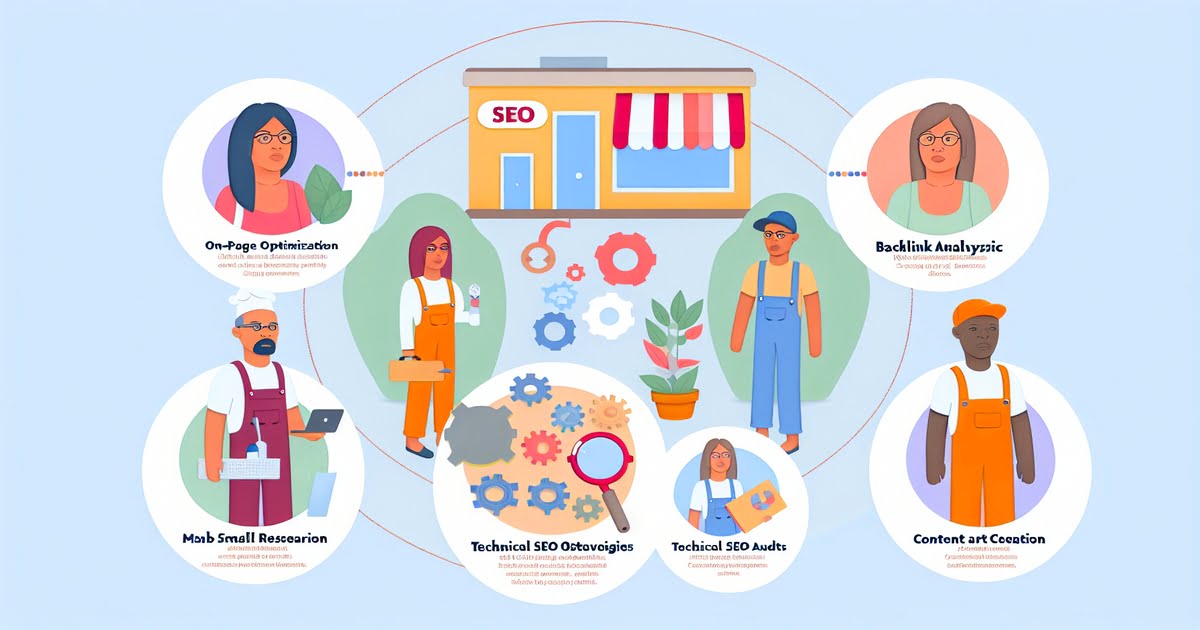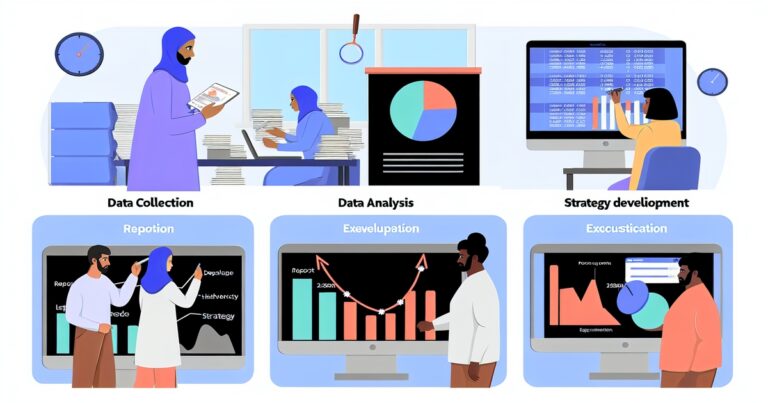In the digital age, small businesses must navigate the online jungle to get noticed. While giants in commerce can shout from the rooftops with hefty marketing budgets, local SEO tactics are your stealthy slingshot, cutting through the noise to hit your target audience with precision. It’s not about swinging at every branch; it’s mastering a few strategic moves that elevate your local visibility and bring customers right to your doorstep. From leveraging customer reviews to optimizing for mobile users, these savvy techniques aren’t just smart—they’re essential for any small business looking to thrive in their community without getting lost in the vast online wilderness.
Key Takeaways
Prioritize Local SEO: Recognize the critical role Local SEO plays in attracting nearby customers and enhancing online visibility for small businesses.
Optimize Your Website: Ensure your website is locally optimized by including location-specific keywords, NAP details (Name, Address, Phone Number), and creating location-based landing pages.
Utilize Google Business Profile: Maximize the benefits of your Google Business Profile by keeping information up-to-date, posting regularly, and responding to reviews to improve local search rankings.
Develop Local Content: Create relevant local content that resonates with your community and incorporates local search terms to drive targeted traffic.
Manage Citations Diligently: Regularly update and maintain listings in local business directories to ensure consistency and accuracy of your business information across the web.
Encourage Customer Engagement: Actively seek customer reviews and engage with reviewers to build trust and signal to search engines the relevance and popularity of your business.
Understanding the Importance of Local SEO
Boosting Visibility
Local SEO is a game-changer for small businesses. It helps your business show up in local searches. This means when someone nearby looks for services you offer, they find you fast. Google My Business (GMB) is key here. Make sure your GMB profile has accurate details: your address, phone number, and hours.
To get noticed locally, encourage happy customers to leave reviews online. Positive reviews improve trust and attract more people to your store or website.
Increased Traffic
When people search for something nearby, they often have immediate needs. If you rank high in local searches, these potential customers might visit your shop first. Offer them great service or products and watch as one-time visitors become regulars.
Local keywords are important too. Use terms that locals type into search engines when looking for what you sell. For example, if you run a bakery in Austin, use phrases like “best cupcakes in Austin” on your website.
Community Connection
Connecting with local customers creates a loyal community around your brand. Sponsor events or collaborate with other local businesses to get involved and build relationships within the area.
Remember social media? Share updates about local events or promotions there too! Your followers will appreciate seeing their hometown featured and may share it further.
Optimizing Websites for Local Search
Keyword Integration
To reach local customers, keywords are crucial. They guide search engines to your site. Include terms that reflect your city or region. Place these in website content and tags.
For instance, a bakery in Orlando might use “Orlando birthday cakes” on their homepage. This tells search engines the business is relevant to cake seekers in Orlando.
Remember, don’t stuff keywords everywhere. Use them naturally within content.
NAP Consistency
NAP stands for Name, Address, Phone number. It’s vital for local SEO success. Ensure this info is the same across your website.
If you’re listed as “Dave’s Deli” on Main Street with a specific phone number on one page but “David’s Delicatessen” elsewhere with different details, it confuses both customers and search engines.
Check all pages of your site for consistent NAP information.
Location Pages
Businesses with several locations benefit from individual pages per address. Each page should have unique details about that location.
A cafe chain can create distinct pages like “Cafe Mocha Downtown” and “Cafe Mocha Uptown.” These pages would include respective addresses and local promotions if any exist.
Such tailored content helps locals find the nearest branch easily.
Leveraging Google Business Profile Effectively
Claim and Verify
To boost your local SEO, claiming and verifying your Google Business Profile is a must. This step makes sure that you have control over the information displayed about your business in Google Search and Maps. When people look for products or services you offer, they’ll find accurate details.
First, search for your business on Google to see if it already exists. If it does, claim it. If not, create a new profile from scratch. Verification typically involves receiving a postcard by mail with a code that you enter online.
Update Regularly
Once verified, keep your profile fresh with up-to-date info. This includes operating hours, contact details, and even temporary closures. Accurate information helps customers trust your business more.
Don’t forget to update photos too! Businesses with recent photos usually attract more attention online.
Utilize Posts
Google Posts are like mini-ads shown directly in search results when someone finds your business listing. Use them to share news like special offers or events.
Posts can include text, images or videos and are an easy way to engage potential customers without needing them to visit another site first.
By following these steps carefully:
Claiming and verifying,
Updating regularly,
Utilizing posts,
You can enhance visibility in local searches significantly.
Crafting Local Content and Keyword Strategies
Local Queries
Creating content that answers local questions is key. You should understand what the people in your area are asking for. Use regional slang to connect with them better.
Imagine you run a bakery in Atlanta. A blog post on “How to make peach cobbler” could include phrases like “y’all” and mention local events where your cobbler is a hit. This makes readers feel at home with your content.
Local news can be gold for content ideas, too. If there’s a street fair, write about it and tie it back to what you offer. Say you’re a locksmith; create an article titled “Staying Secure During the Springfield Street Fair.” It shows you know the area and care about community safety.
Long-Tail Keywords
Targeting long-tail keywords with local modifiers can capture more specific markets. These are longer phrases that locals might use when searching online.
For example, instead of using just “veterinarian,” use “affordable veterinarian in Boise Idaho.” Someone looking for this service will likely choose one nearby over one far away.
Remember not to stuff these keywords into your content awkwardly. They should fit naturally within sentences so that they help both users and search engines find your site easily.
Relevant Events
Incorporate upcoming local events or news related to your business niche into your strategy as well:
Participating in a charity run? Blog about how fitness impacts productivity.
Is there an annual festival? Offer special deals or write about its history linking back to what services or products you provide.
This tactic keeps your brand relevant and connected within the community while improving SEO through updated, localized content.
Managing Local Business Directories and Citations
Accurate Listings
Ensuring your business is listed correctly in local directories is crucial. Top sites like Yelp and YellowPages are often the first places people look when searching for services. Incorrect information can lead to missed opportunities and frustrated potential customers.
First, check your business name, address, phone number (NAP), and website details. They must be the same everywhere they appear online. This consistency helps search engines trust your data, which can improve your local search ranking.
Secondly, you should update these listings regularly. If you move locations or change phone numbers, make sure this new information is reflected across all directories promptly.
Consistent Citations
Citations are mentions of your business on other websites that include your NAP details. Inconsistent citations can confuse search engines and harm your local SEO efforts.
To start with citation cleanup:
Identify all places where your business is listed.
Note any incorrect or outdated information.
Reach out to each site individually to correct errors.
This process might seem daunting but it’s worth the effort for better local visibility. There are tools available that can help automate some of these tasks by finding citations for you and highlighting inconsistencies.
Remember that not every directory carries the same weight in terms of SEO value; prioritize those most relevant to both locality and industry whenever possible.
Industry-Specific Directories
Beyond general local directories, there are likely several industry-specific ones as well. Being present in these specialized spaces means connecting directly with interested audiences who need exactly what you offer.
For example:
A restaurant should ensure they’re on TripAdvisor or Zomato.
A legal firm would benefit from a listing on FindLaw.
Home service providers could use Angie’s List or Houzz to reach homeowners looking for repairs or remodeling services.
Encouraging and Utilizing Customer Reviews
Review System
After managing local business directories, focus on customer reviews. They are key for local SEO success. Set up a system to ask happy customers for feedback after they buy something. Send emails or texts asking them to review their experience.
Make it easy for customers to leave reviews. Provide links straight to your review page on Google or Yelp. Some businesses offer small rewards as a thank you, like discounts on future purchases.
Responding Online
It’s crucial to answer all online reviews, good or bad. Always be professional in your responses.
For positive reviews, thank the customer and mention something specific from their feedback. For negative ones, apologize and address any issues raised. This shows potential customers that you care about service quality.
Responding also signals to search engines that you’re active online which can help with SEO rankings.
Testimonials Display
Show off great testimonials on your site prominently. This builds trust with visitors quickly. Choose diverse testimonials that speak about different aspects of your business such as product quality or customer service.
Add photos or videos if possible – they make testimonials more relatable and powerful.
Mobile Optimization for Enhanced Local Discovery
Fast Websites
Mobile users want quick information. Small businesses must have websites that load fast. Speed is key for keeping people’s attention. A slow site can drive potential customers away.
To ensure speed, optimize images and minimize code. Use tools to measure your website’s speed regularly. Remember, every second counts.
Click-to-Call
People use their phones to find local businesses. It makes sense to help them contact you easily from these devices.
Adding a click-to-call button on your website does just that. With one tap, customers can call your business without dialing the number manually.
This feature is a simple yet powerful tool for increasing customer interactions and improving user experience.
Responsive Design
Lastly, having a mobile-responsive design is crucial. Your site should look good on any device, whether it’s a phone or tablet.
A responsive design adjusts content layout based on screen size automatically. This ensures everything is readable and accessible without zooming or scrolling horizontally.
Check your website on various devices often to make sure it works well everywhere.
Building Backlinks and Local SEO Authority
Community Engagement
Engaging in local events boosts your visibility. Attend or sponsor community activities to get noticed. These actions can lead to backlinks from event pages or news articles.
For example, if you sponsor a charity run, the event’s website might thank you with a link. This not only shows your business cares about its community but also improves your online presence.
Local backlinks are vital for SEO authority. They tell search engines that your business is an active community member.
Implementing Structured Data and Schema Markup
Schema Essentials
Schema markup is a powerful tool for local SEO. It helps search engines understand specific details about your business. By adding schema to your website, you highlight important information such as your business’s name, address, phone number, and operating hours.
When you use schema markup on your site, it can lead to rich snippets in search results. These are enhanced descriptions that appear below the page title. For example, if someone searches for a local bakery, they might see the shop’s ratings or hours directly in the search results because of schema markup.
Structured Data Benefits
Structured data goes beyond just providing contact information. It includes details about events you’re hosting or products available at your location. This extra layer of detail signals to search engines what you offer locally.
If there’s an event coming up at your store or restaurant—like a live music night—you can use structured data to make sure it shows up in relevant local searches. The same goes for unique products or services that people might be looking for nearby.
Location-Based Schemas
Location-based schemas are crucial for businesses targeting customers in certain areas. They help ensure that when someone searches for services “near me,” your business has a better chance of showing up if it’s indeed close by.
Final Remarks
Local SEO isn’t just a buzzword; it’s your ticket to standing out in your neighborhood. You’ve got the tools now: from sprucing up your website for local eyes to getting chummy with Google Business Profile. With savvy content and keywords, you’re speaking their lingo, and those directories? They’re like your business’s online megaphone. Don’t forget, reviews are pure gold, and your site better be snappy on mobile or you’re missing out big time. Backlinks are the digital handshake that boosts your street cred, while structured data is the secret sauce that gets you noticed.
So what’s next? Hit the ground running! Apply these tactics and watch as your business climbs the local ranks. Got questions or need a hand? Reach out – we’re all about helping you bloom where you’re planted. Let’s make sure when locals search, they find you first. It’s showtime!
Frequently Asked Questions
What is Local SEO and why is it important for small businesses?
Local SEO helps your business appear in search results when customers are looking for services or products near them. It’s crucial because it drives targeted traffic, leading to more visits and sales.
How can I optimize my website for local search?
Start by including your city or region and relevant keywords throughout your site. Also, ensure your name, address, and phone number (NAP) are consistent on every page.
What’s the best way to use Google Business Profile for local SEO?
Claim and verify your Google Business Profile. Keep information up-to-date, add photos of your business, respond to reviews promptly, and post regular updates.
Why is crafting local content important?
Local content tailors your message to a regional audience. It makes you relatable and boosts relevance in local search queries.
How do customer reviews affect my local SEO efforts?
Positive reviews increase trustworthiness and signal quality to search engines. Encourage satisfied customers to leave feedback online!
Is mobile optimization necessary for Local SEO?
Absolutely! Most local searches happen on mobile devices. A mobile-friendly website ensures better user experience leading to higher ranking in search results.
How does structured data improve my visibility in local searches?
Structured data helps search engines understand specific details about your business such as location which enhances visibility in rich snippets on SERPs (Search Engine Results Pages).









